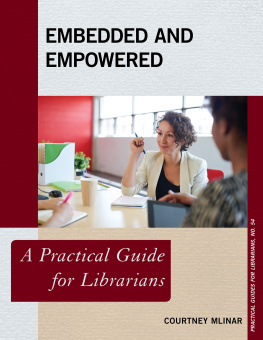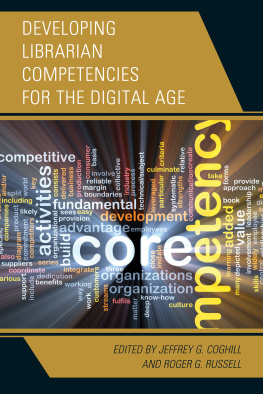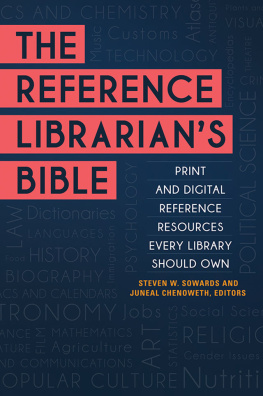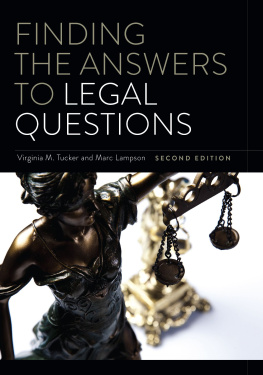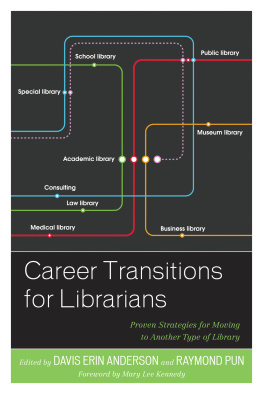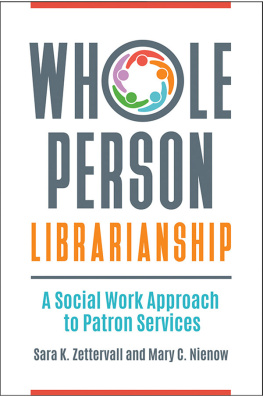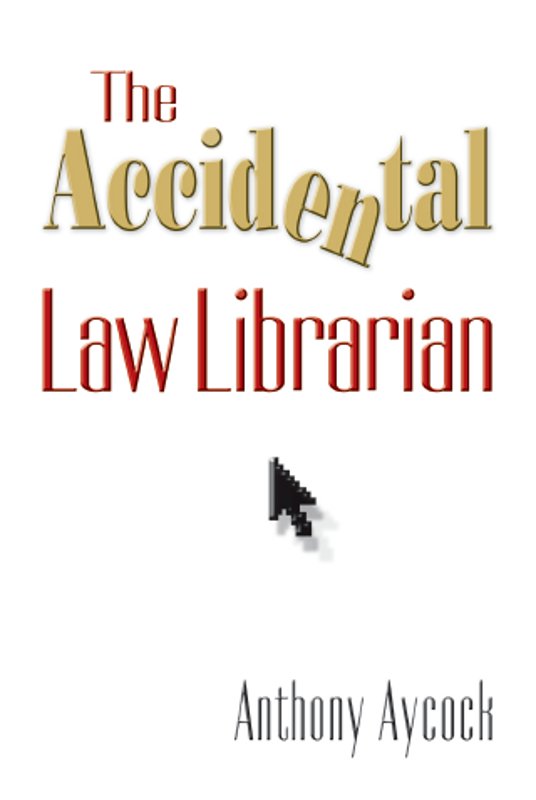
First Printing, 2013
The Accidental Law Librarian
Copyright 2013 by Anthony Aycock
All rights reserved. No part of this book may be reproduced in any form or by any electronic or mechanical means, including information storage and retrieval systems, without permission in writing from the publisher, except by a reviewer, who may quote brief passages in a review. Published by Information Today, Inc., 143 Old Marlton Pike, Medford, New Jersey 08055.
Publishers Note: The author and publisher have taken care in preparation of this book but make no expressed or implied warranty of any kind and assume no responsibility for errors or omissions. No liability is assumed for incidental or consequential damages in connection with or arising out of the use of the information or programs contained herein.
Many of the designations used by manufacturers and sellers to distinguish their products are claimed as trademarks. Where those designations appear in this book and Information Today, Inc. was aware of a trademark claim, the designations have been printed with initial capital letters.
Library of Congress Cataloging-in-Publication Data
Aycock, Anthony, 1973
The accidental law librarian / Anthony Aycock.
pages cm
Includes index.
ISBN 978-1-57387-477-9
1. Law libraries--United States--Handbooks, manuals, etc. 2. Law libraries--Reference services--United States. 3. Legal research--United States--Handbooks, manuals, etc. I. Title.
Z675.L2A97 2013
026'.3400973--dc23
2013008051
Printed and bound in the United States of America
President and CEO: Thomas H. Hogan, Sr.
Editor-in-Chief and Publisher: John B. Bryans
VP Graphics and Production: M. Heide Dengler
Managing Editor: Amy M. Reeve
Editorial Assistant: Brandi Scardilli
Project Editor: Rachel Singer Gordon
Cover Designer: Ashlee Caruolo
Copyeditor: Beverly Michaels
Proofreader: Dorothy Pike
Indexer: Beth Palmer
www.infotoday.com
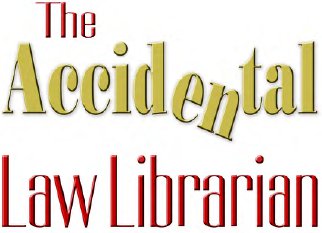
To Regina, Jessica, and Michaela.
Thank you for, well, everything.
accidentallawlibrarian.wordpress.com
Go to accidentallawlibrarian.wordpress.com to find the companion blog for the years hottest new book, The Accidental Law Librarian. (Accidental refers to the decision to work in a law library. The librarians themselves were not necessarily accidents.) On this site, you will find all the links discussed in this book plus others that I find that are ad rem, captivating, or worth a look. I will also add more thoughts on being a law librarian as well as an extra story or two. (Remind me to tell you about needing the October 14, 1998 episode of Guiding Light for a products liability case.)
If you, Constant Reader, want to share a good website or send a story from your nights in the law library trenches, please email me at . I will add them to the blog a mensa et thoro (from bed and table, a term referring to legal separation, and also the two places where I am likely to update this blog).
Disclaimer
Neither the publisher nor the author makes any claim as to the results that may be obtained through the use of this webpage or of any of the internet resources it references or links to. Neither publisher nor author will be held liable for any results, or lack thereof, obtained by the use of this page or any of its links; for any third-party charges; or for any hardware, software, or other problems that may occur as the result of using it. This webpage is subject to change or discontinuation without notice at the discretion of the publisher and author.
Introduction
A few years ago, a staff member at the county public library called the law library where I was working. This was a small North Carolina county with a small library system, and she was calling from one of the branch librariesthe smallest branch, as I recall. This staff member had a patron with a legal question that she couldnt answer and wanted to know if she could send him my way.
Sure, I said, and hung up, thinking I would probably never hear from the patron. When you work in a law library, referrals from public libraries are uncommon, for two main reasons. First, many people who learn they have to drive to another library to tell their story to another librarian simply decide to go home and look up the answer to their question online (not always a good decision, as you will see in this book). The other reason is that many public librarians are unfamiliar with the law libraries in their own area. So, Ill admit that I was surprised by the call I am telling you about.
Dealing With Dan
While I didnt expect the patron to show up, he did, later that same day. He looked about 60, with cotton-white hair and a weathered face, and he walked with the proto-shuffle of a lifelong day laborer. The guyIll call him Dandid not appear to be a lawyer, doctor, professor, architect, stockbroker, artist, or any of the other educated classes. I figured that he probably just wanted to expunge a criminal record (a process spelled out in the North Carolina General Statutes) or locate documents from an old court case (something he would have to go to the courthouse for), and I steeled myself for a lengthy, incoherent encounter.
Dan surprised and shamed me by being well-spoken. He had inherited his fathers house, which sat close to the highway. The Department of Transportation was preparing an offer for this property for a right-of-way, and he was going to meet with them in a few days. Dan wanted to know what questions to ask, what the offer would be based on, and what, if anything, he could do if he didnt like the offer. I heard him toss around words like judgment and easement. To a lawyer, these are terms of art. To the public, they can be as mysterious as Anatolian hieroglyphs.
When he finished his tale, I gave him my standard reply: Thats a huge research project. I say this about all but the simplest requests, not to deter patrons (though some need deterring, such as the ones who want to sue the President or Donald Trump or Satan) but to prepare them. Most legal questions are complex, and truth is a mosaic of facts, not a spectrum. Dan looked at me, undeterred. We have computers with internet access, I suggested, thinking he would be happy if he could sit down and bang keywords into Google. Dan, however, was doubtful: Dont you have books, too?
Well, yes, but it depended on what he wanted. He had said he was interested in cases. To most people, cases means copies of court documents: complaint, answer, judges order, etc. Sometimes, what they really want to know is the amount of money paid by the loser of the case. This is called the judgment. There are books, journals, and newsletters that publish certain judgments, but these tend to be headline cases, ones where the plaintiff got, say, $10 million for having the wrong leg amputated. The average litigant needs run-of-the-mill judgments, which you can get only by visiting the courthouse where a case was tried and asking for a case by docket number. I told Dan this, and he furrowed his brow. When I lived in Florida, he said, I was able to look up cases in law books.
He was talking about case reporters, which publish the rulings of cases on appeal (see ). Now


